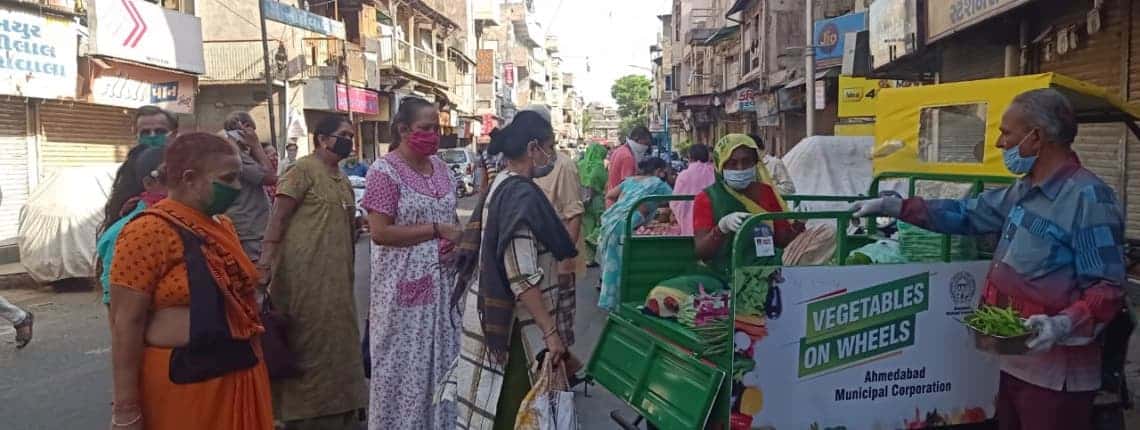On March 24, Narendra Modi, Prime Minister of India, announced a 21-day lockdown across India to deal with the COVID-19 pandemic. The very next day, recognizing that the lockdown would break the food supply chain, the Municipal Corporation of Ahmedabad, India, announced an innovative initiative called “Vegetables on Wheels” to deliver fresh vegetables and milk to curfew wards of the city by e-rickshaws (electric 3-wheel rickshaws).
The world-renowned Self-Employed Women’s Organization (SEWA), a trade union of nearly two-million women informal workers including fresh vegetable and fruit vendors, is headquartered in Ahmedabad. The Ahmedabad Municipal Corporation (AMC) soon asked SEWA to partner with them. As Manali Shah, National Secretary of SEWA, explained, “Street vendors have amazing ability and proficient business sense. They are very robust because no matter what or how, they have to sustain their livelihoods so they are able to feed their families.”
A unique collaboration
The initiative works like this: street vendors are engaged to provide essential food and milk to the citizens in areas of the city that are under curfew due to high concentrations of COVID-19 cases. The AMC issues a curfew pass to the designated vegetable vendors that allows them to go to the wholesale markets in the early morning to buy vegetables, which they transport back to their homes.

The rickshaw drivers, provided and paid for by the AMC, pick up the vendors and their stock from the vendors’ homes. The rickshaw drivers follow a route allocated to them by the AMC during the 3-4 hours when the curfew is lifted. At regular stops along the route, the vendors sell vegetables and milk to local customers, mainly women, who queue up and keep a safe 2-meter distance from one another.
The scheme started with 12 e-rickshaws operating in the central zone of Ahmedabad and later expanded to include tempos (3-wheel vans), as well as e-rickshaws, operating in the south zone of the city. Each vendor is able to sell and earn more each day through this initiative than she or he would have been able to do prior to COVID-19.
Maintaining safety
But both the vendors and drivers are taking the risk of being exposed to – and passing on – the virus. After one rickshaw driver tested positive for COVID-19, the AMC issued protective masks and gloves to the drivers and vendors. SEWA has sent an audio message by WhatsApp to all SEWA members involved in this initiative, instructing them on how to keep themselves, the drivers, their customers and their families safe.
SEWA street vendors leading the way
As of April 27, vegetables and milk were being delivered to all the curfew-affected wards of Ahmedabad by a total of 62 “Vegetables on Wheels” rickshaws and tempos. All those who sell vegetables and milk from each of these rickshaws and tempos are vegetable-vending members of SEWA.
Geetaben Koshti, a senior SEWA organizer, and her team of young street vendor leaders like Jignasaben, are working hard to ensure the initiative runs smoothly with the hope that it will expand to include more and more vendors.
One of the street vendors engaged in the initiative is Revaben, a street vendor leader of SEWA. She recently mentioned how fortunate she feels to be able to get work in these tough times, stating, “I am able to feed my children and family during this crisis because of this initiative; otherwise, we would have died of hunger, not of corona!”
Paving a new way forward
The “Vegetables on Wheels” initiative has attracted a good deal of attention within India. On April 3, a national government committee on “facilitating supply chain and logistics management”, one of 11 committees set up by Prime Minister Modi to advise on COVID-19 crisis management, suggested that the initiative should be replicated, where feasible, across India.
SEWA hopes that the contribution of street vendors in delivering essentials during the pandemic-cum-lockdown will be recognized and valued and that municipalities will allow vendors across the country to sell essential goods and services – in the natural markets in public spaces where for generations they have sold goods at affordable prices, especially to low-income households and communities.
And Manali Shah of SEWA has a special dream inspired by the unique collaboration of street vendors, SEWA and the Ahmedabad Municipal Corporation: namely, that cooperatives of street vendors will be able to buy e-rickshaws, receive training on taking orders online or by WhatsApp and be allowed to sell to households and housing societies across Ahmedabad and other cities on an ongoing basis; and that SEWA rural members who grow vegetables will be able to sell their produce through the cooperatives. As Manali explains: “Formalization of street vendors should involve recognition of their contributions to food security as well as the permission and support to vend in areas where their customers live or congregate.”
Read more about COVID-19 and street vendors here.
Feature photo: In Ahmedabad, India, street vendors are playing a crucial role in ensuring food security for all areas of the city in a collaborative initiative that has the potential for replication in cities across the country. Credit: SEWA
